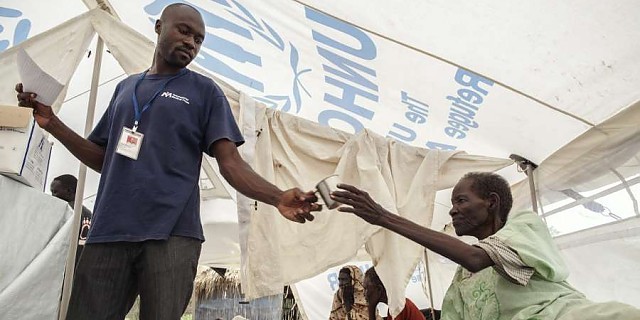The South Sudanese Ministry of Health has dispatched a team of experts to Maban County to assess the spread of Hepatitis E in camps for refugees from Blue Nile. The minister, Dr. Michael Milli Hussein, said the experts will come up with strategies to control the outbreak especially in Yusuf Batil camp.
Hepatitis E has claimed the lives of 107 while there are a total of 4,870 suspected cases from the four refugee camps in Maban County, a case fatality rate of 2.2%, said the health minister at a press conference yesterday.
The death toll reported yesterday is higher than the figure given Monday by an UNHCR spokesman as quoted by Radio Bakhita, who said that there were 69 deaths in the four camps between July 2012 and January 2013.
World Health Organization, for its part, confirmed the fatalities were close to the number cited by the minister. “We have already lost over a hundred lives,” said a WHO official identified as Dr. Nasser.
Young adults from ages 15 to 40 years are most often affected by the disease. Symptoms include fever, heartburn, stomach pain, nausea and vomiting, body pain, itching, loss of appetite, general body pain, dark urine, and yellow coloration of the eyes.
The camps affected are Jamam, Jandrassa, Yusuf Batil and Doro camps. The camps host over 111,000 people from Blue Nile. “Doro camp, the most populated has reported more cases in the past few weeks,” the minister said.
The worst affected camp, Yusuf Batil, has seen the total number of cases increase from 575 in the last week of November to 2,986 cases as of today, while the number of deaths increased from 14 at the end of November to 73 deaths in the same period. Yusuf Batil is the second largest camp in Maban hosting over 37,000 refugees.
The daily increase of the cases has put immense pressure on the available health services and resources. “This is of grave humanitarian concern,” said Milli.
The minister said the general public, particularly the community of Maban County should be aware that the government “takes the situation very seriously.” He said improvements in the water and sanitation conditions in the refugee camps could help contain the upsurge of the outbreak.
The ministry is working closely with partners to interrupt the spread of Hepatitis E. He appealed to donors and UN agencies to provide technical and financial resources to support all the needed interventions.
By Yobu Annet




